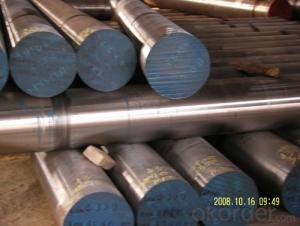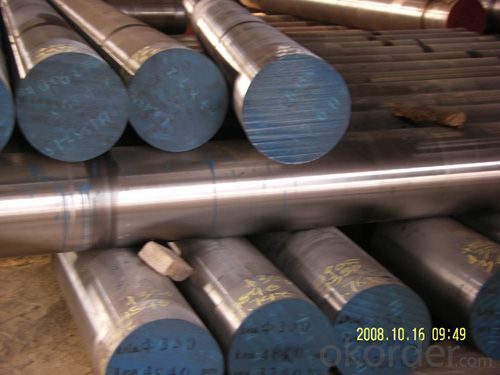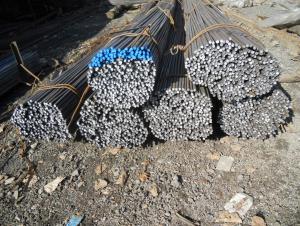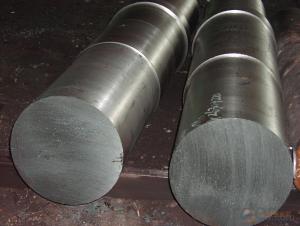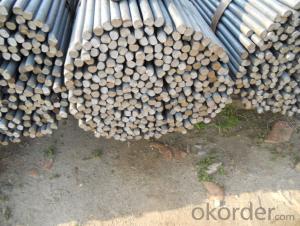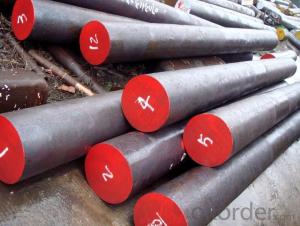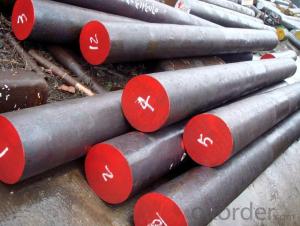Alloyed Round Bar and GB Standard
- Loading Port:
- China Main Port
- Payment Terms:
- TT or LC
- Min Order Qty:
- -
- Supply Capability:
- -
OKorder Service Pledge
OKorder Financial Service
You Might Also Like
Product Description:
OKorder is offering Round Bar at great prices with worldwide shipping. Our supplier is a world-class manufacturer of steel, with our products utilized the world over. OKorder annually supplies products to European, North American and Asian markets. We provide quotations within 24 hours of receiving an inquiry and guarantee competitive prices.
Product Applications:
After hot-rolled the products shaped into coil and delivery as finished product, including round, square, rectangular, hexagonal and so on. Since most of the products are round, it is generally called wire rod. Carbon steel wire rod is widely used in construction and manufacturing. Carbon steel wire rod is mainly used for reinforcement of reinforced concrete and welded structure or reprocessed (roberts , nail, etc.) materials, especially used to produce wire drawing, welding electrode, nails, spring, electronic, precise machinery parts and so on.
Product Advantages:
OKorder's Round Bar are durable, strong, and resist corrosion.
Main Product Features:
· Premium quality
· Prompt delivery & seaworthy packing (30 days after receiving deposit)
· Corrosion resistance
· Can be recycled and reused
· Mill test certification
· Professional Service
· Competitive pricing
Product Specifications:
Manufacture: Hot rolled
Grade: Q195 – 235
Certificates: ISO, SGS, BV, CIQ
Length: 6m – 12m, as per customer request
Packaging: Export packing, nude packing, bundled
Trademark | Rank | Chemical composition (quality score) % | |||||
C | Si | Mn | S | P | |||
| ≤ |
| ≤ | ≤ | |||
Q235 | A | 0.14-0.22 | 0.30 | 0.30-0.65 | 0.050 | 0.045 | |
Q235 | B | 0.12-0.20 | 0.30 | 0.30-0.70 | 0.045 | 0.045 | |
Trademark | Rank | Pulling Test | |||||
Bend PointΔs/Mpa | Tensile Strength | Elongation Ratioδ5% | |||||
Thickness (Diameter) /MM | Thickness (Diameter) /MM | ||||||
≤16 | 16-40 | ≤16 | 16-40 | ||||
≥ | ≥ | ||||||
Q235 | A | 235 | 225 | 375-500 | 26 | 25 | |
Q235 | B | 235 | 225 | 375-500 | 26 | 25 | |
FAQ:
Q1: Why buy Materials & Equipment from OKorder.com?
A1: All products offered byOKorder.com are carefully selected from China's most reliable manufacturing enterprises. Through its ISO certifications, OKorder.com adheres to the highest standards and a commitment to supply chain safety and customer satisfaction.
Q2: What makes stainless steel stainless?
A2: Stainless steel must contain at least 10.5 % chromium. It is this element that reacts with the oxygen in the air to form a complex chrome-oxide surface layer that is invisible but strong enough to prevent further oxygen from "staining" (rusting) the surface. Higher levels of chromium and the addition of other alloying elements such as nickel and molybdenum enhance this surface layer and improve the corrosion resistance of the stainless material.
Q3: Can stainless steel rust?
A3: Stainless does not "rust" as you think of regular steel rusting with a red oxide on the surface that flakes off. If you see red rust it is probably due to some iron particles that have contaminated the surface of the stainless steel and it is these iron particles that are rusting. Look at the source of the rusting and see if you can remove it from the surface.
Images:
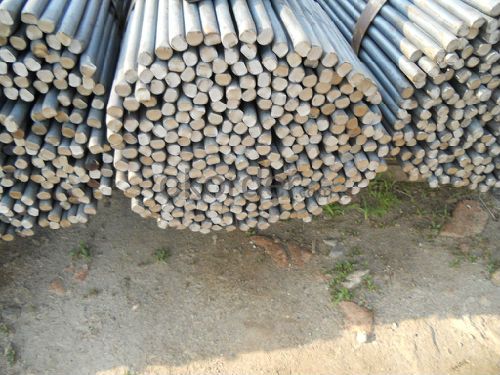
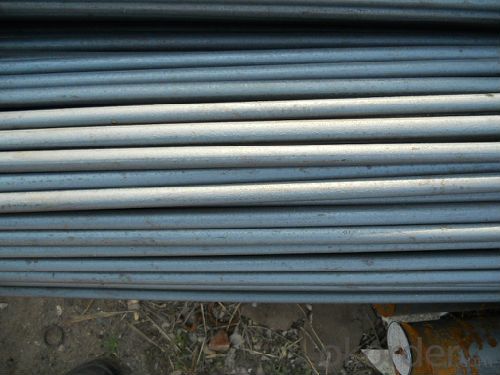
- Q: Can steel round bars be used for pump shaft applications?
- Indeed, pump shaft applications can make effective use of steel round bars. The prevalence of steel round bars in pump shafts can be attributed to their exceptional strength, durability, and resistance against corrosion. Considering the high torsional loads pump shafts face and the necessity to endure the strains of rotating machinery, steel round bars provide the essential mechanical attributes to withstand these circumstances, rendering them an apt selection for pump shaft applications. Moreover, the adaptability of steel permits diverse heat treatments and surface finishes to amplify its efficiency and longevity in pump shafts.
- Q: Can steel round bars be coated or painted?
- Yes, steel round bars can be coated or painted. Coating or painting steel round bars can provide protection against corrosion, enhance aesthetics, and improve durability.
- Q: Are steel round bars suitable for the production of axles?
- Indeed, axles can be produced using steel round bars. Steel, being a robust and long-lasting material, offers exceptional strength and stability, rendering it an optimal selection for axles. The circular form of these bars facilitates effortless machining and shaping processes, guaranteeing an accurate and efficient axle design. Moreover, steel round bars possess commendable resistance against wear, fatigue, and impact, indispensable attributes for axles that must endure demanding loads and harsh environments. All in all, steel round bars are a dependable and extensively employed material in diverse industries, including automotive, manufacturing, and construction, for axle production.
- Q: What is the difference between a hot-rolled and a forged steel round bar?
- The main difference between a hot-rolled and a forged steel round bar lies in the manufacturing process and the resulting properties of the finished product. Hot-rolled steel round bars are produced by heating a billet or ingot of steel to a high temperature and then shaping it into the desired form using rollers. This process allows for a high volume of production and a wide range of sizes and shapes. As the steel is heated and shaped, it undergoes significant deformation and recrystallization, resulting in a uniform grain structure. Hot-rolled steel round bars have a rougher surface finish and can have varying levels of internal stress due to the cooling process. They are commonly used in applications where strength and cost-effectiveness are important, such as construction, manufacturing, and general fabrication. On the other hand, forged steel round bars are produced by applying extreme pressure to a heated billet or ingot of steel, typically using a hammer or a press. This process creates a much stronger and more durable product compared to hot-rolled steel. The intense pressure applied during forging aligns the steel's grain structure, resulting in improved mechanical properties such as increased strength, toughness, and resistance to fatigue and impact. Additionally, the forging process eliminates internal voids and porosity, making forged steel round bars more reliable and less prone to failure. Due to the high level of customization and precision involved in forging, these round bars are often used in critical applications that require superior strength and performance, such as aerospace, automotive, and oil and gas industries. In summary, the main differences between hot-rolled and forged steel round bars lie in their manufacturing processes and resulting properties. Hot-rolled steel offers cost-effectiveness and a wide range of sizes and shapes, while forged steel provides superior strength, durability, and reliability. The choice between the two depends on the specific application and the desired performance characteristics.
- Q: How do you measure the hardness of a steel round bar?
- The hardness of a steel round bar can be measured using various methods, with the most common being the Rockwell hardness test. In this test, a diamond or steel ball indenter is pressed into the surface of the steel at a specific load, and the depth of the indentation is measured. The hardness value is determined based on the depth of the indentation and the applied load. Other methods like Brinell and Vickers hardness tests can also be used, depending on the specific requirements and characteristics of the steel.
- Q: Can steel round bars be used for making shafts?
- Yes, steel round bars can be used for making shafts. Steel round bars are commonly used for their strength, durability, and machinability, making them suitable for shaft applications in various industries such as automotive, construction, and manufacturing.
- Q: What are the different types of steel round bar surface treatments for improved hardness?
- There are several different types of steel round bar surface treatments that can be used to improve hardness. Some common treatments include case hardening, nitriding, and induction hardening. Case hardening involves adding carbon to the surface of the steel to create a hardened outer layer, while nitriding involves introducing nitrogen to form a hard nitride layer. Induction hardening uses heat to quickly heat and cool the surface of the steel, creating a hardened layer. These treatments can significantly enhance the hardness and wear resistance of steel round bars.
- Q: Can steel round bars be used for making electrical components?
- Whether steel round bars can be used for making certain electrical components depends on the specific requirements and applications. Steel is a versatile material that possesses good electrical conductivity and high durability, making it well-suited for a variety of electrical applications. However, when it comes to components that necessitate specific electrical properties or insulation, copper or aluminum may be more commonly utilized. Furthermore, in order to prevent corrosion or enhance electrical conductivity, it may be necessary to subject steel round bars to surface treatments or coatings. Ultimately, the appropriateness of utilizing steel round bars for manufacturing electrical components should be evaluated in accordance with the specific requirements and regulations of the intended application.
- Q: Can steel round bars be used for making decorative items?
- Yes, steel round bars can definitely be used for making decorative items. Steel round bars are versatile and can be shaped, bent, and welded to create various decorative designs. They offer durability and strength, making them suitable for both indoor and outdoor applications. Steel round bars can be used to make decorative furniture, sculptures, railings, gates, light fixtures, and much more. Their sleek and modern appearance adds an industrial and contemporary touch to any space. Additionally, steel round bars can be finished with different coatings or treatments, such as powder coating or patina, to enhance their visual appeal and protect them from corrosion. Therefore, steel round bars are an excellent choice for creating decorative items due to their versatility, strength, and ability to add a stylish and unique touch to any design.
- Q: What are the different types of corrosion-resistant steel round bars?
- In the market, one can find a variety of corrosion-resistant steel round bars. The most commonly used types are as follows: 1. Stainless Steel Round Bars: Stainless steel is a popular choice when it comes to applications that require resistance to rust and corrosion. Its high resistance stems from the presence of chromium, which creates a protective oxide layer on the steel's surface, effectively preventing further corrosion. 2. Duplex Stainless Steel Round Bars: Duplex stainless steel is a unique type of stainless steel that combines austenite and ferrite microstructures in a balanced manner. This combination grants it exceptional corrosion resistance, high strength, and excellent weldability. 3. Nitronic Stainless Steel Round Bars: Nitronic stainless steel is an alloy known for its exceptional performance. It offers superior corrosion resistance, high strength, and good ductility. The presence of nitrogen further enhances its ability to resist pitting and crevice corrosion. 4. Alloy Steel Round Bars: Alloy steel refers to steel that has been alloyed with various elements in order to enhance its properties. Some alloy steels, including corrosion-resistant alloys (CRA), are specifically designed to withstand corrosion in harsh environments. These alloys typically contain elements such as chromium, nickel, and molybdenum. 5. Aluminum Round Bars: Although not technically steel, aluminum round bars are commonly used in applications where corrosion resistance is crucial. Aluminum forms a protective oxide layer on its surface, effectively preventing corrosion. It is particularly suitable for applications where weight is a concern. 6. Copper-Nickel Round Bars: Copper-nickel alloys, such as Cu-Ni 90/10 and Cu-Ni 70/30, are extensively utilized in marine and offshore applications due to their excellent resistance to seawater corrosion. These alloys possess high strength, good ductility, and exceptional resistance to biofouling. These examples represent only a fraction of the corrosion-resistant steel round bars available in the market. The choice of material depends on specific application requirements, environmental conditions, and budget considerations. Consulting a materials engineer or specialist is crucial in selecting the most suitable corrosion-resistant steel round bar for a particular application.
Send your message to us
Alloyed Round Bar and GB Standard
- Loading Port:
- China Main Port
- Payment Terms:
- TT or LC
- Min Order Qty:
- -
- Supply Capability:
- -
OKorder Service Pledge
OKorder Financial Service
Similar products
Hot products
Hot Searches
Related keywords
